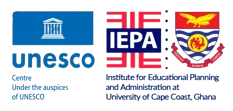
History
The Institute for Educational Planning and Administration (IEPA) was established in August 1975 based on a joint agreement between the Government of Ghana and UNESCO/UNDP (Number GHA/72/018/E/01/13) with an initial mandate to build and strengthen capacity in educational planning and administration of experts and non-experts and to inform educational policy formulation and implementation through research.
The IEPA is incorporated within the University of Cape Coast as an autonomous Institute that continues to train educational planners, leaders and administrators as well as support sector-wide activities in education in Ghana.
In 2013, the IEPA began a process of application to become a UNESCO Category II Centre. Through a series of feasibility studies, realignment and restructuring, IEPA met the criteria set out for a UNESCO Category II Centre. In November 2019, Dr. Mathew Opoku Prempeh, the Honourable Minister of Education led the IEPA team and Ghana’s delegation to the 40th Session of the General Conference of UNESCO. The General Conference approved the elevation of IEPA to a UNESCO Category II Centre of Excellence for West Africa. The General Conference further authorized the Director-General of UNESCO to sign the corresponding agreement with the Government of Ghana for operations.
In November 2020, Her Excellency Anna Bossman, Ghana's Ambassador Extraordinary and Plenipotentiary to France and Portugal and Permanent Representative of Ghana to UNESCO, signed the agreement on behalf of the Government of Ghana whilst Mrs. Audrey Azoulay, Director-General of UNESCO, did same for UNESCO in a virtual signing ceremony which took place at the UNESCO office in Paris. The agreement spelt out the commitment of both parties and more specifically, addresses the mandate, responsibilities, and obligations of IEPA.
The IEPA has maintained the role of lead institute for developing educational planners, leaders and administrators and providing technical and professional support to Ghana’s education sector and is poised to extend this expertise to the African region. The IEPA as a UNESCO Category II Centre will build the capacity of the workforce in the education sector in the West African sub-region in the areas of Educational Planning, Leadership and Administration as well as technical assistance and policy advice to support sector-wide planning and policy development
The IEPA has highly qualified staff with expertise in Educational Planning, Administration and Leadership; as well as Policy Analysis, Research and Consultancy, Curriculum Planning and Development.
The uniqueness of the Institute lies in its capacity to translate research into successful practices in educational planning, administration and leadership. In this respect, the Institute employs action research, clinical pedagogy and andragogy through an internship, simulation in lecture halls, integration of classroom work and experiential learning, student innovation and creativity expositions (EXPOs) as means of addressing 21st Century education and learning needs.
The elevation of IEPA to a Category II status boosts the Institute’s agenda towards scaling-up short courses and other stakeholder engagements on contemporary issues in education through online platforms. In achieving its objectives, the IEPA now a Category II Centre of Excellence for West Africa, would specifically, engage in research, capacity building as well as support sector-wide policy development and planning in education and thereby promote innovation and development within the sub-region.
